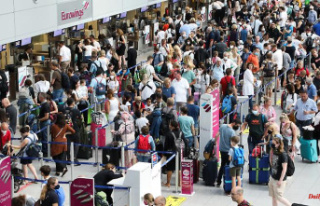Help for Ukraine "as long as it is necessary". New sanctions against Russia and a price cap on oil from the country. Also money against world hunger and a climate club. In an interview, Chancellor Scholz was satisfied with the results of the G7 summit. Here is an overview.
The G7 summit in Elmau, Bavaria is over and Chancellor Olaf Scholz was visibly satisfied. In an interview with "RTL Direkt" he said that the summit was more than just a photo opportunity. "There was a lot more. We spoke very carefully." When asked how many "height meters" one had covered at this summit in terms of concrete results, Scholz said: "We actually got to the top. All participants also reported it here."
Scholz also praised the fact that one could speak informally. This was more difficult in Corona times and during video conferences: "Everyone reads their slips of paper, there is no formation of an opinion. That actually only works if you really talk to each other. We did that here."
But what have the most powerful democratic industrialized countries decided? An overview:
The Russian invasion of Ukraine was the focus of the summit. President Volodymyr Zelenskyj was connected via video on Monday. The G7 states stand "closely and steadfastly on the side of Ukraine," Scholz said at the end of the summit. "We agree: President (Vladimir) Putin must not win this war." The states agreed on further "financial, humanitarian, military and diplomatic" aid - "as long as it is necessary", as it was said on Monday.
The G7 states want to support the Ukrainian state budget with 27.5 billion euros this year alone. Humanitarian aid should also be paid. Ukraine should also get more weapons. The country's reconstruction is to be discussed at a separate conference that Scholz wants to prepare together with EU Commission President Ursula von der Leyen. The Chancellor spoke of a "gigantic task".
According to Scholz, the G7 countries want to "keep up and drive up the economic and political costs for President Putin and his regime". Plans for further sanctions, which are intended to hit the Russian defense industry in particular, were already announced on Monday. In addition, those responsible for war crimes should be subject to punitive measures.
In addition, the states are working on a price cap for Russian oil so that Moscow does not benefit from rising energy prices. The plans are still not very specific, but according to the summit paper, the responsible ministers should "urgently strive to develop a price cap for oil". Implementation is extremely difficult. There is talk, for example, of pushing through the project for services related to Russian oil - then insurance and ship transport of Russian oil could be banned. Because a large part of the ship transport is insured via the insurance marketplace Lloyd's of London, German companies also play a major role in reinsurance. In addition, shipping companies from EU countries are involved in the transport. A price cap for gas is also under discussion.
The aim is also to sanction the export of gold from Russia. Concrete measures have not yet been decided, the topic should first be discussed within the EU.
Hundreds of millions of people are currently suffering from hunger worldwide. But because of the war, the lack of grain exports from Ukraine, one of the world's largest wheat suppliers, could exacerbate the problem massively. The G7 countries are therefore not only calling on Russia to unconditionally end the blockade of Ukrainian ports. They also want to contribute $4.5 billion to the fight against hunger, bringing the annual amount to more than $14 billion. "We have therefore forged a global alliance for food security," said Scholz. However, development organizations criticize the funds as far too small.
Chancellor Scholz was pleased that the G7 countries wanted to implement his idea of a climate club. By the end of the year, the "open and cooperative" association is to be formed, in which willing states are to work on reducing greenhouse gas emissions. "We agree: we need more ambition, more ambition, to achieve our climate goals," said Scholz. The project could also be attractive for developing countries because the G7 countries want to use energy partnerships to help poorer countries with expertise and money in the transition to a more climate-friendly economy.
The summit also reaffirmed the goal of reducing dependence on oil and gas from Russia and promoting the expansion of renewable energies and climate protection.
The G7 want to counter China's growing influence with a comprehensive investment program. 600 billion dollars (568 billion euros) are to flow into developing countries. It is a continuation of an EU program that envisages investments of 300 billion euros by 2027. 200 billion dollars are now coming from the USA and 65 billion from Japan - a significant part of which comes from private investors.
The G7 want to step up the fight against forced labour. This is aimed at China, which is accused of using them in the provinces of Tibet and Xinjiang. The democratic industrial nations also accuse the People's Republic of unfair practices in world trade to the detriment of their companies. They now want to work with partners to oppose behavior "that distorts the global economy".












